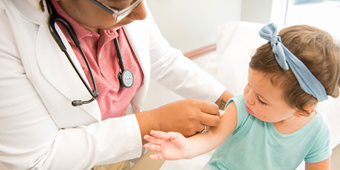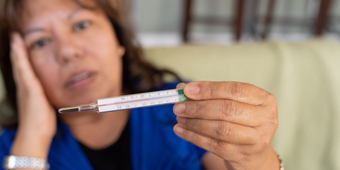Wash, Rinse, And Sanitize: How To Prevent Giardiasis

Find Your Perfect Match
Answer a few questions and we'll provide you with a list of primary care providers that best fit your needs.
Giardiasis is an infection of the small intestine caused by a parasite called Giardia lamblia. The condition causes diarrhea and other related symptoms, such as loss of appetite, nausea, and headache.
Anyone can get giardiasis The parasite lives in soil, food, water, and in animal and human waste.
What Causes a Giardia Infection?
The Giardia parasite spreads in many ways. The most common include:
- Exposure to someone else with giardiasis
- Direct person-to-person contact at daycares, nursing homes, and similar facilities
- Eating uncooked or undercooked food that contains Giardia organisms
- Swallowing pool or recreational water
- Drinking unpurified water from lakes, streams, ponds, and rivers
- Drinking water or using ice made from untreated or improperly treated wells
- Swallowing Giardia picked up from surfaces contaminated with feces, such as bathroom handles, changing tables, diaper pails, or toys
- Swallowing water while swimming or playing in water where Giardia may live, especially in lakes, rivers, springs, ponds, and streams
- Traveling to countries where giardiasis is common
- Unprotected anal sex
If you are infected with the Giardia parasite, you likely will experience symptoms within seven to 14 days of exposure.
Symptoms Of Giardiasis
If you are infected with the Giardia parasite, you likely will experience symptoms within seven to 14 days of exposure.
Symptoms include:
- Diarrhea that is explosive and foul-smelling
- Gas, bloating, and flatulence
- Nausea
- Loss of appetite
- Headache
- Fever
- Dehydration
- Weight loss
Healthy people usually recover from giardiasis within two to six weeks. In some people, symptoms may last longer.
 Diagnostic Tests
Diagnostic Tests
If you show signs of giardiasis, your doctor can perform stool tests to see if the Giardia parasite is present. These include:
- Stool antigen test, which checks for the presence of antigens for the Giardia lamblia parasite in the stool or fluid form the upper intestines
- Stool ova and parasites exam, which looks for the Giardia parasite or eggs in a stool sample.
Treating a Giardia Infection
If a giardiasis infection is mild, no treatment may be needed. Some infections go away without treatment within a few weeks. In more serious cases, your doctor may prescribe antibiotics to cure the infection, reduce symptoms, and prevent the spread of disease.
Treatments include:
- Antibiotics such as tinidazole, nitazoxanide, or metronidazole. A change in the type of antibiotic will be tried if symptoms do not go away.
- Staying hydrated. Drink plenty of water to avoid dehydration.
Pregnant women should not be treated until after the baby is delivered. Some medicines used to treat giardiasis can be harmful to an unborn baby.
If you are being treated for giardiasis, and you experience new symptoms, call your doctor right away. Concerning symptoms include:
- Dehydration
- Weight loss
- Blood in stool
- Diarrhea and other symptoms for more than 14 days
7 Steps To Prevent Giardiasis
You can prevent a Giardia parasite infection by practicing good hygiene and safe drinking and eating practices, including:
- Wash your hands after using the bathroom and before eating.
- Wash your hands each time you change a child's diaper.
- If you work in a daycare center, nursing home, or other institution, use good hand washing and hygiene techniques when going from child to child or person to person.
- Don't drink from rivers and streams. Purify all water from naturally occurring bodies of water and wells before drinking it. Use methods such as boiling or a water filtration kit.
- Do not drink recreational or pool water.
- Wash and/or peel fresh fruits and vegetables before eating.
- Prevent contact and contamination with feces during sex.
Find Your Perfect Match
Answer a few questions and we'll provide you with a list of primary care providers that best fit your needs.
Sources: Medline Plus; Centers for Disease Control and Prevention




